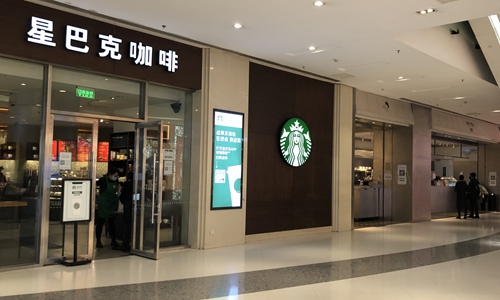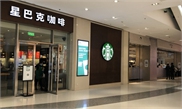
A view of a Starbucks outlet in Beijing in March Photo: Zhang Hongpei/GT
A second Chinese city found food safety issues at a local Starbucks branch on Tuesday, a day after the US coffee chain was exposed for using expired ingredients in its drinks.
Market regulators in Suzhou, East China's Jiangsu Province carried out an investigation into 226 Starbucks branches in the city and 18 had problems such as incomplete purchase and sales inventories, uncovered garbage cans in the processing area, employees not wearing masks, mixed storage of food and non-food in the warehouse.
The authorities have ordered the stores to carry out rectification within a specified time.
This marks the second Chinese city that has found food safety issues at Starbucks stores after a scandal over expired ingredients in Wuxi, East China's Jiangsu Province on Monday.
Starbucks China apologized and pledged to strengthen self-inspection and rectification on Monday.
"We have confirmed that the employees of the two Wuxi stores have violated food safety standards. We sincerely apologize to all Starbucks customers," the company said in a statement on its official Weibo account later on Monday.
The two stores have been closed for further investigation and rectification. The company has also pledged to launch self-inspection on food safety at all its stores in the mainland, carry out safety training for the employees, increase the frequency and scale of third-party investigations, strengthen the internal reporting channels for food safety problems and explore more technical means to reduce the interference of human operation factors on quality.
On Tuesday, a Global Times reporter saw that the customer flow remained stable at a branch in Shanghai, with some queues during the noon break.
A staff member told the Global Times that all the sandwiches and cakes in the cabinet will be disposed of at the end of the business day as required by the company.
A former Starbucks employee approached by the Global Times also said that they are not allowed to use expired ingredients in the store. "The ingredients are marked with the date after opening, and will be thrown away after reaching the expiry date," the employee told the Global Times.
The recent food scandal was uncovered by two reporters from The Beijing News, who carried out undercover investigations at two Starbucks shops in Wuxi from late October to mid-November.
In a video clip that went viral, one staffer used unsealed chocolate liquid and matcha liquid to make drinks, despite the labels on the bottles showing the materials were expired. Unsealed bread that should have been taken off the counter on the next day was put out for sale, the video showed.
"Although Starbucks adopts direct-sale stores in the mainland, the retail store managers are responsible for the performance and profit. Therefore, they may turn a blind eye to food safety," Zhu Danpeng, a Chinese analyst focusing on the food industry, told the Global Times on Tuesday.
Starbucks has been operating in the Chinese mainland since 1999 and has marketed itself as using top industrial standards.
However, before this incident, it was fined and warned twice this year for selling expired food.
In April, a branch in Ningbo, East China's Zhejiang Province was fined 10,000 yuan ($1,572) for selling expired food. In November, one of its branches in Shenzhen, South China's Guangdong Province was warned by local market supervision authorities for keeping expired moon cakes in the food cabinet, Nanfang Metropolis Daily reported.
Starbucks has more than 5,100 shops in over 200 cities across China, according to its official website. The company reported third-quarter revenue in China of $910 million in the 2021 fiscal year, an increase of 45 percent compared with the same period last year.

